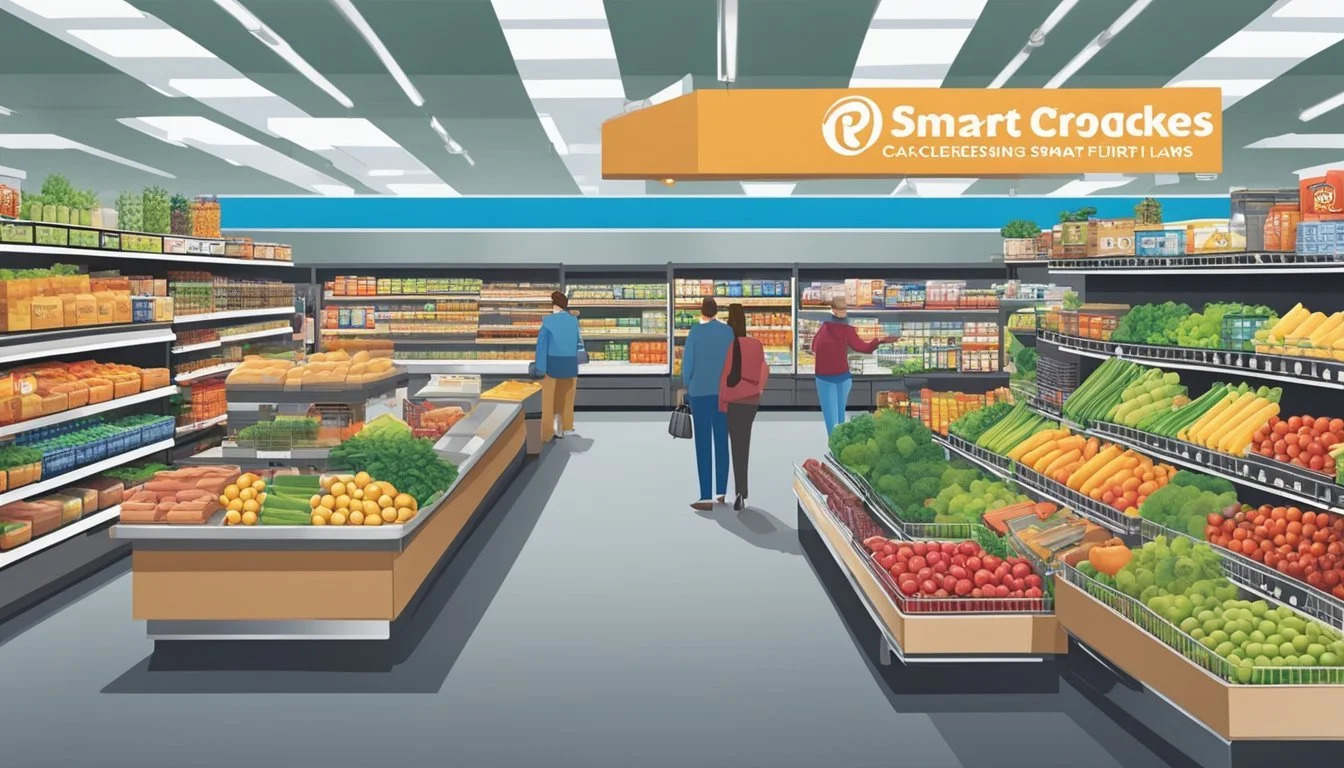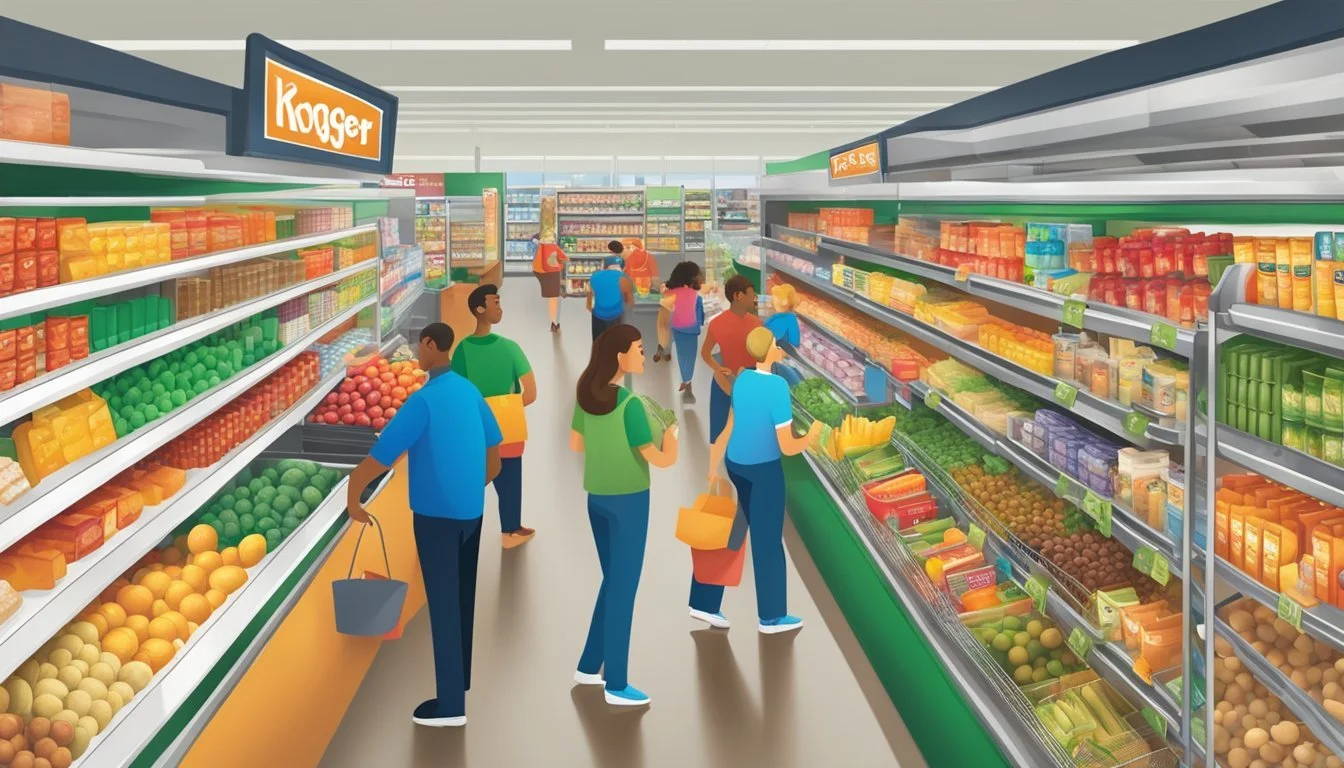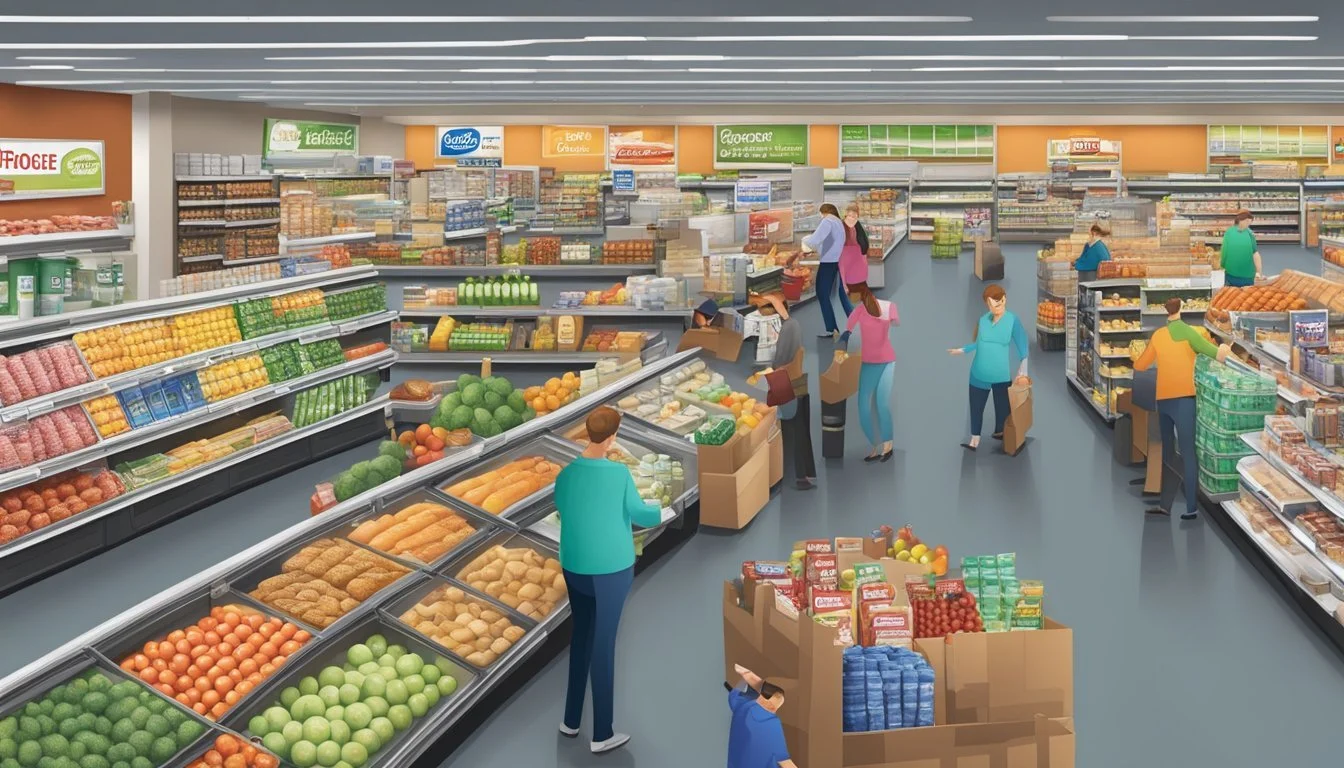Kroger vs Smart & Final
A Price and Quality Comparison
Grocery shopping can be a significant part of household budgets, making the choice of store crucial for many consumers. Kroger and Smart & Final are two popular options, each with its own strengths and offerings.Kroger, a long-established supermarket chain, is known for its wide selection of products and competitive pricing. Smart & Final, on the other hand, positions itself as a hybrid between a warehouse store and a traditional grocery outlet. While Kroger typically offers more variety and brand options, Smart & Final often provides better prices on bulk items and restaurant-quality products.
Both stores have their merits, and the best choice may depend on individual shopping habits and preferences. Factors such as location, store layout, product quality, and customer service also play a role in determining which store provides the better overall experience for shoppers.
Company Backgrounds
Kroger stands as one of America's largest supermarket chains. Founded in 1883 by Barney Kroger in Cincinnati, Ohio, the company has grown exponentially over the decades.
Today, Kroger operates over 2,700 stores across 35 states. The retailer offers a wide range of products, including groceries, pharmacy items, and fuel.
Smart & Final has a rich history dating back to 1871. Originally established in Los Angeles, California, it began as a small store catering to both households and businesses.
The company has evolved into a unique hybrid of a warehouse store and a traditional supermarket. Smart & Final currently operates over 250 locations, primarily in the western United States.
Both chains have adapted to changing consumer needs over time. Kroger has expanded its digital offerings and delivery services, while Smart & Final has maintained its focus on bulk purchases and restaurant supplies.
Kroger's annual revenue exceeds $120 billion, making it a major player in the grocery industry. Smart & Final, while smaller in scale, has carved out a niche market with its warehouse-style stores and diverse product range.
These two retailers represent different approaches to grocery retail, each with its own strengths and target markets.
Range of Products
Kroger and Smart & Final offer distinct product selections tailored to different customer needs. Their inventory varies in terms of variety, store brands, and health-focused options.
Variety and Selection
Kroger stocks a wide array of products, catering to diverse consumer preferences. Their stores typically feature 30,000-50,000 unique items. This includes an extensive produce section with both conventional and organic fruits and vegetables.
Smart & Final focuses on bulk items and restaurant-quality products. Their stores carry around 15,000-20,000 items. They excel in large-format packaging, making them popular among small business owners and large families.
Kroger offers more specialty and gourmet items, while Smart & Final emphasizes everyday staples and bulk purchases.
Store Brands Comparison
Kroger boasts several popular private label brands. Simple Truth is their organic and natural line, while Private Selection offers premium products at competitive prices. These brands span numerous categories, from groceries to household items.
Smart & Final's main store brand is First Street, which covers a range of products from pantry staples to frozen foods. They also offer Sun Harvest for natural and organic items.
Kroger's store brands tend to have more variety and cover a broader range of product categories compared to Smart & Final's offerings.
Organic and Healthy Options
Kroger has made significant strides in expanding its organic and health-conscious selections. Their Simple Truth brand includes over 1,500 organic products. Kroger stores often have dedicated sections for natural and organic items.
Smart & Final's organic offerings are more limited. Their Sun Harvest brand provides some organic options, but the selection is not as extensive as Kroger's.
Both stores stock organic produce, but Kroger typically offers a wider variety. Kroger also tends to have more options for specialty diets like gluten-free, vegan, and keto-friendly products.
Price and Value
Kroger and Smart & Final offer distinct pricing strategies and value propositions for shoppers. Both stores aim to provide competitive prices, but their approaches differ in key ways.
Everyday Prices and Discounts
Kroger emphasizes its loyalty program and digital coupons to provide savings. Customers can earn fuel points and receive personalized discounts through the Kroger Plus card. Smart & Final takes a different approach, focusing on bulk purchases and club-style pricing without a membership fee.
Kroger's prices on national brands tend to be slightly higher than Smart & Final's. However, Kroger often runs more frequent promotions and offers a wider variety of discounts.
Smart & Final's everyday prices are generally lower, especially on bulk items and store brands. This makes it attractive for large families or small businesses looking to stock up.
Grocery Prices and Sales
Kroger typically has lower prices on fresh produce and meats compared to Smart & Final. Weekly sales at Kroger often feature deep discounts on select items, sometimes offering prices lower than Walmart's.
Smart & Final's strength lies in its competitive pricing on pantry staples and frozen goods. Their "Extra" store format provides a broader selection of household items at prices comparable to big-box retailers.
Both stores offer digital coupons, but Kroger's app and website make it easier to clip and redeem offers. Smart & Final's sales tend to focus more on bulk items and multi-packs, providing value for high-volume shoppers.
Price comparison studies suggest Smart & Final is about 14% cheaper than average grocery stores in some regions. However, individual shopping habits and specific item preferences can greatly influence which store provides better overall value for each customer.
Quality and Freshness
Product quality and freshness vary between Kroger and Smart & Final. Each store has its strengths and weaknesses when it comes to produce, meats, and dairy offerings.
Produce Quality
Kroger emphasizes fresh produce with colorful displays and a wide selection of fruits and vegetables. Their produce departments often feature local and organic options. Smart & Final's produce quality can be inconsistent, as their focus is more on bulk items.
Kroger typically has better produce handling practices. They rotate stock frequently and remove spoiled items promptly. Smart & Final's produce sometimes shows signs of bruising or overripeness.
Both stores offer pre-cut fruit and veggie options for convenience. Kroger tends to have more variety in these ready-to-eat produce items.
Meat and Dairy Freshness
Kroger operates in-store butcher counters at many locations, allowing for fresher cuts of meat. Their selection includes premium options like USDA Choice and Prime beef. Smart & Final focuses more on packaged meats and bulk frozen options.
Kroger's chicken is generally fresher, with a mix of conventional and antibiotic-free choices. Smart & Final carries larger packages of chicken suited for food service needs.
For dairy, Kroger stocks a wider range of brands and specialty items like organic milk and artisanal cheeses. Smart & Final's dairy selection is more limited but includes bulk sizes ideal for businesses.
Kroger typically has shorter expiration windows on perishables, indicating faster turnover. Smart & Final's dairy products often have longer sell-by dates due to their focus on shelf-stable and bulk items.
Shopping Experience
The shopping experience at Kroger and Smart & Final differs in several key aspects. Convenience, store atmosphere, and customer interactions all play important roles in shaping the overall experience for shoppers at these two grocery chains.
Convenience of Location
Kroger operates over 2,700 stores across the United States, primarily in the Midwest and Southern regions. This extensive network provides easy access for many shoppers in those areas. Kroger stores are often found in suburban neighborhoods and shopping centers.
Smart & Final has a smaller footprint with around 300 locations, mostly concentrated in the Western United States. Their stores are typically situated in urban and suburban areas, catering to both individual consumers and small businesses.
The closer proximity of Kroger stores in certain regions may offer greater convenience for some shoppers. However, Smart & Final's urban locations can be advantageous for city dwellers seeking quick access to groceries and bulk items.
Store Cleanliness and Organization
Kroger stores generally maintain a clean and well-organized environment. Aisles are typically wide and clearly labeled, making it easy for customers to navigate and find desired products. The produce section is often prominently displayed and well-maintained.
Smart & Final stores have a more warehouse-like atmosphere. While clean, the layout can feel more utilitarian. Products are often stocked in bulk quantities on metal shelving units. This setup can be efficient for shoppers seeking larger quantities but may feel less inviting for casual grocery runs.
Both chains prioritize cleanliness, but Kroger's traditional supermarket layout may appeal more to shoppers seeking a conventional grocery experience.
Customer Service Interaction
Kroger emphasizes customer service as a key part of its shopping experience. Stores are usually well-staffed, with employees available to assist shoppers in finding items or answering questions. Many locations offer self-checkout options for added convenience.
Smart & Final takes a more streamlined approach to customer service. While staff are available to help, the focus is on efficiency and quick transactions. This approach can benefit shoppers who prefer a fast, no-frills experience.
Both chains train their employees to be helpful and courteous. Kroger may offer more personalized assistance, while Smart & Final prioritizes speedy service for customers making larger purchases.
Consumer Services
Kroger and Smart & Final offer various services to enhance customer convenience and shopping experiences. Both chains have adapted to changing consumer needs with delivery and pickup options.
Delivery and Pickup Options
Kroger provides home delivery through its own service and partnerships with third-party platforms. Customers can schedule deliveries within specific time slots. The chain also offers curbside pickup at most locations, allowing shoppers to order online and collect groceries without entering the store.
Smart & Final has expanded its delivery options in recent years. The company partners with Instacart for same-day delivery services. Curbside pickup is available at select Smart & Final locations, though the service is not as widespread as Kroger's.
Both retailers have mobile apps for easy ordering and account management. Kroger's app includes digital coupons and personalized deals based on shopping history.
Additional In-Store Services
Kroger operates pharmacies in many of its stores, providing prescription services, vaccinations, and health screenings. The chain also offers Money Services for check cashing, money transfers, and bill payments.
Smart & Final focuses primarily on grocery and household items. While it doesn't typically include pharmacies, some locations feature self-service coin counting machines and sell money orders.
Kroger's larger stores may include additional services like floral departments, deli counters, and fuel centers. Smart & Final emphasizes bulk purchasing options for both household and business customers.
Market Presence and Accessibility
Kroger and Smart & Final have distinct footprints and store formats that impact their accessibility to consumers. Their market presence varies significantly in terms of geographic coverage and store locations.
National and Regional Footprint
Kroger operates a vast network of grocery stores across the United States, with locations in 35 states. This extensive presence gives Kroger broad regional accessibility, particularly in the Midwest and Southern regions. Kroger's store count exceeds 2,700 supermarkets nationwide.
Smart & Final has a more limited regional focus, primarily serving the Western United States. The chain operates over 250 stores, with a strong presence in California, Nevada, and Arizona. This concentrated footprint allows Smart & Final to tailor its offerings to local preferences but limits its accessibility for consumers outside these areas.
Store Accessibility and Hours
Kroger stores are typically located in suburban and urban areas, often in shopping centers or standalone locations. Many Kroger stores operate 24 hours a day, providing convenience for consumers with varied schedules. The company also offers online ordering and delivery services in many markets.
Smart & Final stores are often found in urban areas and are known for their smaller, warehouse-style format. Store hours vary by location but generally range from early morning to late evening. Smart & Final caters to both retail consumers and small businesses, offering bulk items alongside traditional grocery products.
Both chains strive to provide convenient shopping experiences, but their different store formats and locations can impact accessibility for different consumer groups. Families and individuals may find Kroger more accessible in many regions, while small business owners might prefer Smart & Final's bulk offerings in its operating areas.
Consumer Preferences and Satisfaction
Shoppers have varying preferences when choosing between Kroger and Smart & Final. Both stores strive to meet customer needs, but their approaches differ in key areas.
Customer Loyalty and Rewards
Kroger's loyalty program offers personalized deals and fuel points. Members receive digital coupons and earn rewards on purchases. The Kroger app makes it easy to track savings and clip offers.
Smart & Final's loyalty program is less extensive. They offer a Business Rewards program for commercial customers. This includes bulk purchase discounts and dedicated support.
Kroger's more robust rewards system may appeal to frequent shoppers. Smart & Final's focus on business customers caters to a specific niche.
Consumer Satisfaction Ratings
Consumer Reports ranks Kroger higher than Smart & Final for overall satisfaction. Kroger scores well for produce quality and store cleanliness. Customers appreciate their wide selection of organic and natural products.
Smart & Final receives positive feedback for competitive pricing on bulk items. Their no-frills approach appeals to budget-conscious shoppers. However, some customers note limited variety compared to larger chains.
Both stores face criticism for occasional long checkout lines. Kroger's self-checkout options help mitigate this issue in some locations.
Conclusion
Kroger and Smart & Final both offer unique strengths to shoppers. Kroger excels in its wide selection of national brands and private label products. The retailer's loyalty program provides valuable savings opportunities for regular customers.
Smart & Final stands out for bulk purchasing options and competitive pricing on many items. Its smaller store formats can offer a quicker, more convenient shopping trip for some consumers.
In terms of pricing, Smart & Final often has the edge on pantry staples and bulk goods. However, Kroger's frequent sales and personalized discounts can result in significant savings for savvy shoppers.
The shopping experience differs between the two chains. Kroger typically offers a more traditional supermarket layout with extensive departments. Smart & Final's warehouse-style stores cater to both individual shoppers and small businesses.
Neither retailer emerges as a clear overall winner. The better choice depends on individual shopper preferences, typical purchase quantities, and specific product needs. Budget-conscious consumers may find better deals at Smart & Final, while those seeking a full-service grocery experience may prefer Kroger.
Shoppers can benefit from utilizing both stores strategically, taking advantage of each retailer's strengths to maximize savings and product selection.









